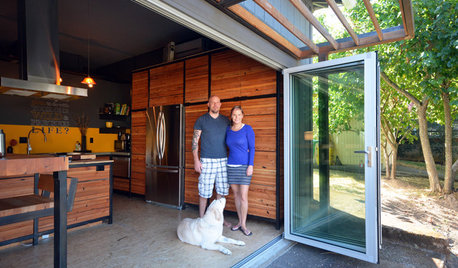refinancing a home
victory_tea2085
9 years ago
Featured Answer
Comments (31)
Elmer J Fudd
9 years agolast modified: 9 years agovictory_tea2085
9 years agolast modified: 9 years agoRelated Discussions
Advice needed
Comments (8)Chuck, A) your 4.5% ARM is likely to adjust downward at its reset, B) shortterm rates are likely to stay low plenty longtime going forward, C) note modifications are likely available on your primary, and possible on your rental, D) All the above can make your lease/option business blossom into functionality... You are not "at the end of options." ALTERNATIVELY; You don't have enough cash to bring to the table in order to refinance any of the homes. Any refi will be against the CURRENT value, not some past historical value... so in order to get down to the LTV level you may qualify for you'd have to pay down a huge amount of the previous balance at closing. Further, if you go to shortsale on the mortgaged homes, the universal default clauses in your revolving credit cards will likely kick your low rated accounts up to the sky... dismal, but a reality to anticipate. You're unfortunate in your geographical location... and yet (given you've learned about lease-option methods) you are equally blessed in opportunity in the Michigan region, where the numbers really work for that strategy. I believe it appears that the best strategy you might be facing is to prepare for a 5-7 year "institutional credit vacation" (meaning you accept that you won't have much traditional institutional credit options for that long,) and then navigate your exit from your overleveraged properties via shortsale. Your qualified accounts are skinny enough its very unlikely any lien-releasing banks would insist on tapping them, nor insist on your carrying back a payment plan on unsecured default balances... so I don't see much risk in this for you at all (short of giving up the chances at traditional institutional leverage for a spell.) This is not a "moral" conversation... but one of market realities for where you are in the country, specifically. Luck! Dave Donhoff Leverage Planner...See MoreRefinancing: when to cut your losses and switch banks?
Comments (10)Thanks. Yes, the lock extension fell out of the picture largely because DH had done the paperwork and I thought he'd gone with the 45-day lock. As day 45 approached, I pointed out that we needed to push the LO to close or at least update us, and DH *then* mentions that actually it had been a 30-day lock! Ah well. In the end, I'm glad we didn't pay for the extension, though, as we're now about to be beyond 90 days, which is the longest the bank extends. (Interestingly, for new loans they also only offer 60- and 90-day locks now---when we applied the options were 30 and 45. Hmmm...) DH was in regular contact with the LO during that stretch, though, and was constantly assured that "everything is moving along fine; don't worry!" We can't transfer the appraisal, but it's helpful anyway since property taxes in our area are based on value at Jan. 1 if it's fallen over the previous year, and this was done a few days later, so it's probably worthwhile to have anyway as documentation for next year's assessment. We're also happy to pay the title company since they did a good job of turning things around immediately and they shouldn't take a hit for a situation outside their control; it's the bank's in-house costs I don't feel that we should pay if we don't close with them, since the delay is of their doing. Just not sure if legally we must pay them anyway. At this point I'm half tempted to just delay the closing till they finally drop their rates again (which I imagine will happen eventually as they seem to be the last man standing at 5.5%, though who knows) and it becomes a moot point....oy!...See MoreTime frame for selling a house after refinance
Comments (4)There is nothing that can ever stop you from trying to sell your house at any time. It's possible that your loan has a prepayment penalty and it will cost you xtra to sell so soon ... but if you can pay the penalty, yes you can sell. FHA is leery of homes that are resold quickly after refinance or initial purchase - but this affects the potential buyer who is trying to use an FHA loan, not the seller and not another buyer who has another type of financing. FHA's concern is that an unscrupolous seller makes a huge profit on a house that may of only had a cosmetic repair done and is now quickly being sold at an inflated value. FHA actually places a cap on how much "profit" a seller can make in a short period of time. I don't remember if it's the cap is in place for 3 months or 6 months. But even then, the cap is fairly large in my opinion and really only affects professional flippers....See MoreRefinancing
Comments (2)Hi Petunia, If you qualify for conforming (FannieMae or FreddieMac) that wouldn't carry the expensive MIP premiums that FHA does. ALL lending programs available today are government-backed... and frankly, as a borrower, it really makes no difference to you anyway. The loans aren't dangerous to the borrowers... they are dangerous to the funding investors (since that's who loses money in defaults, foreclosures, and unilateral government giveaways.) Luck, Dave Donhoff Leverage Planner...See Morecearbhaill (zone 6b Eastern Kentucky)
9 years agolast modified: 9 years agovictory_tea2085
9 years agolast modified: 9 years agoazmom
9 years agolast modified: 9 years agoElmer J Fudd
9 years agolast modified: 9 years agoFeatherBee
9 years agolast modified: 9 years agoFeatherBee
9 years agolast modified: 9 years agoemma
9 years agokudzu9
9 years agobry911
9 years agolast modified: 9 years agokudzu9
9 years agolast modified: 9 years agobry911
9 years agolast modified: 9 years agokudzu9
9 years agobry911
9 years agolast modified: 9 years agokudzu9
9 years agobry911
9 years agoElmer J Fudd
9 years agokudzu9
9 years agoElmer J Fudd
9 years agokudzu9
9 years agodadoes
9 years agobry911
9 years agoElmer J Fudd
9 years agobry911
9 years agoElmer J Fudd
9 years agobry911
9 years agocindywhitall
9 years agobry911
9 years agoChristopher Shafer
8 years ago
Related Stories

REMODELING GUIDESThe Dos and Don'ts of Home Appraisal
Selling your house? These tips from the pros will help you get the best possible appraisal
Full Story
MY HOUZZHouzz TV: A Couple’s Garage Becomes Their Chic New Home
Portland, Oregon, homeowners find freedom in a city-approved garage home with DIY industrial flair
Full Story
REMODELING GUIDESHome Building: The Case for Cautious Optimism
Ben Bernanke's speech at the 2012 International Builders Show: Gray clouds and silver lining
Full Story
SMALL HOMESHouzz Tour: Rolling With Simplicity in a Tiny House on Wheels
Just 240 square feet, this California home encourages efficient living — but there’s still room for yoga
Full Story
HOUZZ TOURSHouzz Tour: A Creekside Cabin Opens to the Views
With a modern addition featuring expansive windows, a rustic 1930s cabin opens its arms wider to its Northern California woodland setting
Full Story
HOUZZ TOURSHouzz Tour: Having Fun With a Half-Buried House
Layers of dirt help create energy efficiency and an unusual look on a steep slope in Washington state
Full Story
REMODELING GUIDESHouzz Survey Results: Remodeling Likely to Trump Selling in 2014
Most homeowners say they’re staying put for now, and investing in features to help them live better and love their homes more
Full Story
LIFEHouzz Call: What's Your New Year's Resolution for the House?
Whether you've resolved to finally finish a remodeling project or not stress about your home's imperfections, we'd like to hear your plan
Full Story
REMODELING GUIDESWhere to Splurge, Where to Save in Your Remodel
Learn how to balance your budget and set priorities to get the home features you want with the least compromise
Full Story
MOST POPULAR10 Things to Ask Your Contractor Before You Start Your Project
Ask these questions before signing with a contractor for better communication and fewer surprises along the way
Full StorySponsored
More Discussions



Elmer J Fudd